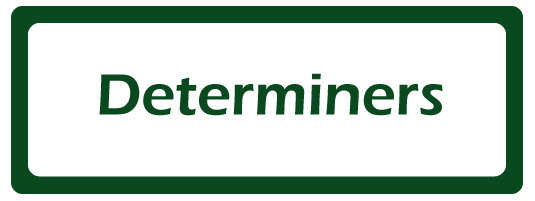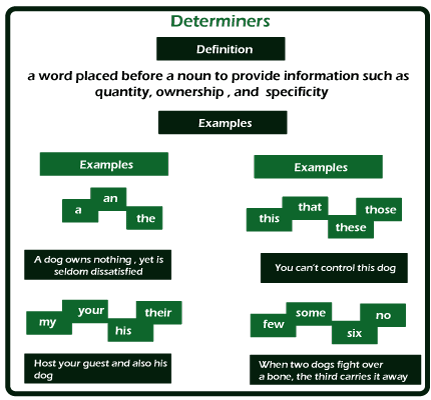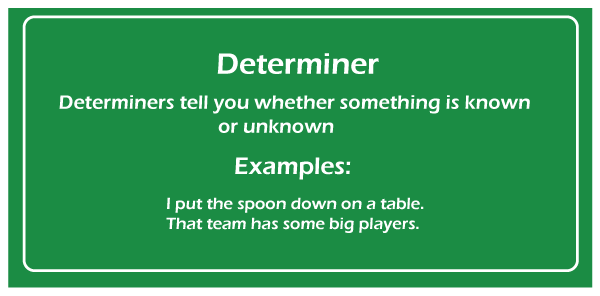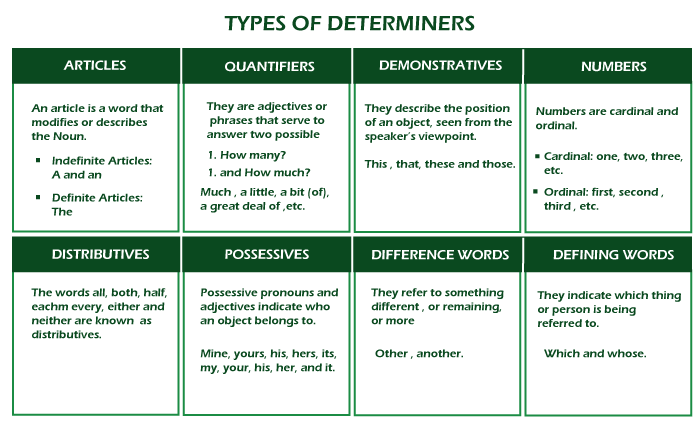DeterminersDeterminers are often used in English to give information about the nouns or introduce the nouns. Determiner examples will teach you about the various sorts of determiners. 
Determiners DefinedWhat exactly is a determiner? Simply explained, a determiner is a term in English that presents a noun or gives details about the quantity of a noun. It is often used preceding, not after, a noun, and it is also utilized prior to any other adjectives utilized to characterize the noun. Determiners must occur in front of a singular noun but rather are optional when presenting plural nouns. 
Examples of DeterminersConsider the position and use of the common determiner "the" in the following sentences:
Irrespective of whether the noun is the subject or the predicate, the determiner is always positioned prior to the noun or noun phrase. 
Types of DeterminersIn English, determiners are classified into four types: articles, demonstratives, quantifiers, and possessives. Definite and Indefinite ArticlesOne of the most prevalent determiners is articles. The singular articles are a, an, and the. Articles clarify (or determine) the noun to which the person speaking is referring. A and an are indefinite articles that are used to refer to a generalized form of a noun. A is utilized prior to words that start with consonants, whereas an is used preceding terms that start with vowels or vowel sounds.
The statement in these examples refers to cat or ostrich in general, implying any cat. Use an indefinite article when your meaning or purpose is broad. "The" is a definite article, indicating that the person speaking is alluding to a particular noun.
The speaker is talking about a specific dog and a specific eatery. It is not a broad category but rather a specific species or location. Use a definite article when your message is clear. Examples of DemonstrativesDemonstratives are employed when the presenter can refer to the thing they are referring to, making them more precise than definite articles. In English, demonstrative pronouns are also employed as determiners. They are as follows: this, that, these, and those.
Note: This and that are singular, but these and those are plurals.Determiners as QuantifiersQuantifiers show how much of the noun is being explored. Words like all, few, and many are among them.
All can be combined with additional determiners to describe which things are intended (i.e., all the clothes in this bag). The quantifier always appears prior to the article or is demonstrative in this circumstance. As in the second scenario, you can also use all by itself to allude to things in general. 
Examples of PossessionPossessive pronouns can be used to demonstrate possession when alluding to a noun that pertains to someone or something. My, your, his, her, its, our, and their are examples of possessive pronouns.
The determiner always appears prior to the noun and any altering adjectives. The possessive can be used in English whether the noun is singular or plural. The Determiner's FunctionExamples of noun and possessive determiners What role do determiners play in grammar? A determiner explains if something is specific or generic. It also specifies an item's connection to the speaker. The following can be specified/identified by a determiner :
Multiple Determinants RulesThere are rules in English about word order, such as when many adjectives change the very same noun in a sequence (quantity before age, before color, for example). The same is true when using many determiners in a line. "Whenever there is more than one determiner, apply the following helpful rules: a) Put all and both in front of other determiners. For example, we tasted all the dishes. Both my daughters are at university. b) In exclamations, put what and such in front of a and an. For example, "What an awesome day!" I haven't seen such a huge group before ! c) Follow other determiners with many, many, more, most, few, and little. E.g., Her many victories made her well-known. They have no more water. Some cash I have is yours. Noncount and Count NounsCertain determiners function with count nouns, whereas others do not. For instance, several attaches to count nouns, "The kid had many stones." In comparison, you would not be using much to connect to count nouns like stones but much to connect to noncount nouns like homework, as in "The high schooler had much homework to accomplish before exams." Other determiners, including all, apply with either one: "The kid had all the stones" and "The high schooler had all the homework to complete before exams." How to Use DeterminersHow do you decide which determiner to use? Since determiners are so frequently employed in front of nouns, knowing which determiner to use is second nature for native English speakers. It's useful to remember the following rules when studying English as a second language :
Recognizing DeterminersAs you explore English vocabulary, it becomes easier to choose the determiner that best illustrates your meaning, whether you choose to show ownership, number, or relative position. Adjective vs. DeterminerWhat exactly does determiner mean? A determiner explains the meaning of a generic or specific noun. What exactly does an adjective mean? An adjective alter the noun. Since they are both used before a noun, determiners and adjectives have a similar appearance. Furthermore, both adjectives and determiners convey more information about nouns. Examples and definitions of determiners On the other hand, a determiner illustrates the noun's relationship to the speaker, while an adjective specifies a property of the word. Let's use "cat" as an example to understand the concept of adjective and determiner. My white cat began to meow. The determiner is "my," while the adjective is "white." The term "my" indicates the cat's attachment to the speaker, whereas "white" is merely a cat characteristic or quality. Common Errors in DeterminersIncorrect: She handed over us any money. Incorrect: Much kids are dancing there. Incorrect: She doesn't have some money. Incorrect: Many a men danced at the event. Incorrect: Danny is a man of much words. Incorrect: She is both rich as well as sincere. Incorrect: My all colleagues were absent. Incorrect: The all pears are tangy. Incorrect: She has warned you much times. Incorrect: I have no any buddy. SummaryA determiner is a term that alters a noun by evaluating the kind of relationship it has. Determiners are words that are added before nouns to make them more broad or specific. Determiners differ from adjectives in that they convey the speaker's connection to the noun, while adjectives define a property of the noun.
Next TopicTypes Of Determiners
|
 For Videos Join Our Youtube Channel: Join Now
For Videos Join Our Youtube Channel: Join Now
Feedback
- Send your Feedback to [email protected]
Help Others, Please Share










